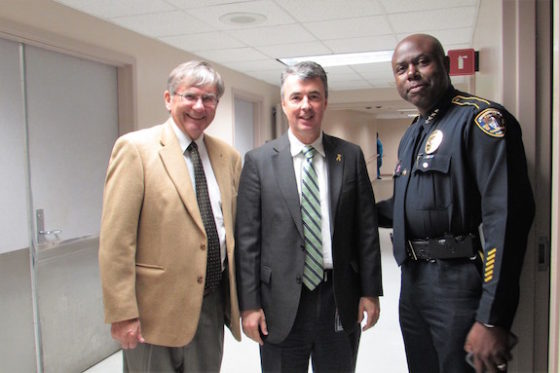State Attorney General addresses Demopolis Rotary

Alabama ranks No. 1 in the country for the number of prescriptions written per capita for opioids state Attorney General Steve Marshall told the Demopolis Rotary Club Wednesday.
Opioid use is one of the most pressing issues facing the nation today, he said. Some 147 people die daily from opioid overdose, more fatalities in three weeks than died in the 9/11 disaster.
Marshall said he is among those appointed by Gov. Kay Ivey to a task force to determine what actions can be taken to stem the use of addictive prescription drugs, what he said is more a public health issue than one of law enforcement. He is firmly convinced of the need to actively take steps to solve the problem rather than just talking and studying the issue.
He referred to previous success in curtailing meth labs in the state. Because of steps taken, the number of meth labs plummeted 90 percent in just five years.
Law enforcement officers are becoming mental health professionals today, Marshall continued, and jails are more often than not turned into detox facilities. He said the country has to get over the stigma of seeking help for mental health issues.
Former Gov. Robert Bentley appointed Marshall to become Alabama’s attorney general to finish out the term vacated by Luther Strange, the former AG, who Bentley appointed to the U.S. Senate. Marshall said he already had been planning to run for the post and is expected to campaign for the job in the next regular election.
The attorney general post is the last state elected job he will strive for, he promised. “I don’t want to be your governor. I don’t want to be your senator,” he told Rotarians.
When he took the AG post, Marshall asked people what they expected of him.
“Don’t embarrass us,” was the response he got most, which he said was very sad.
“We should be held to a higher standard,” he stated.
Calling himself a storyteller, Marshall related three cases he tried in which he learned lessons that have stayed with him since his start in Marshall County. The first concerned a young woman who was an addict and drug dealer murdered by an irate client. While the prevailing attitude was that the community was better off with one less dealer, Marshall treated her case the same as any other, and the murderer received a 108-year sentence.
The woman’s mother said her daughter had made some bad mistakes in her life, but her murder “took away her chance to change.”
Through his actions, he said, the community began to see law enforcement in a new way. Distrustful residents began to cooperate with police officers. “We saw a safer place.”
The second case saw Marshall prosecuting a respected police officer who offered to make tickets or arrests disappear if certain women he cited would do him a favor. His accusers were a stripper, drug addict, thief and body piercer, none of whom ordinarily would gain sympathy from a jury.
“I have a responsibility to enforce the law,” said Marshall. “I did the right thing for the right reason,” and the officer is serving jail time.
Every day we get to change lives, he said, as he told a third story. A 12-year-old girl testified against her step-grandfather for sexual abuse, which he denied. After the man’s conviction, the young girl looked into Marshall’s eyes for the first time and thanked him for believing in her when no one else would.
Among those attending the Rotary meeting were three Demopolis police officers, including Marshall’s good friend Chief Tommie Reese. When Marshall was asked if law enforcement is as well respected around the state as the officers are in Demopolis, the AG said, “I don’t know of anyone more respected than Tommie Reese.”
Smaller communities have a kinship that can be lacking in larger cities, Marshall continued, and added he is willing “to work with those who are willing to risk their lives for total strangers.”

